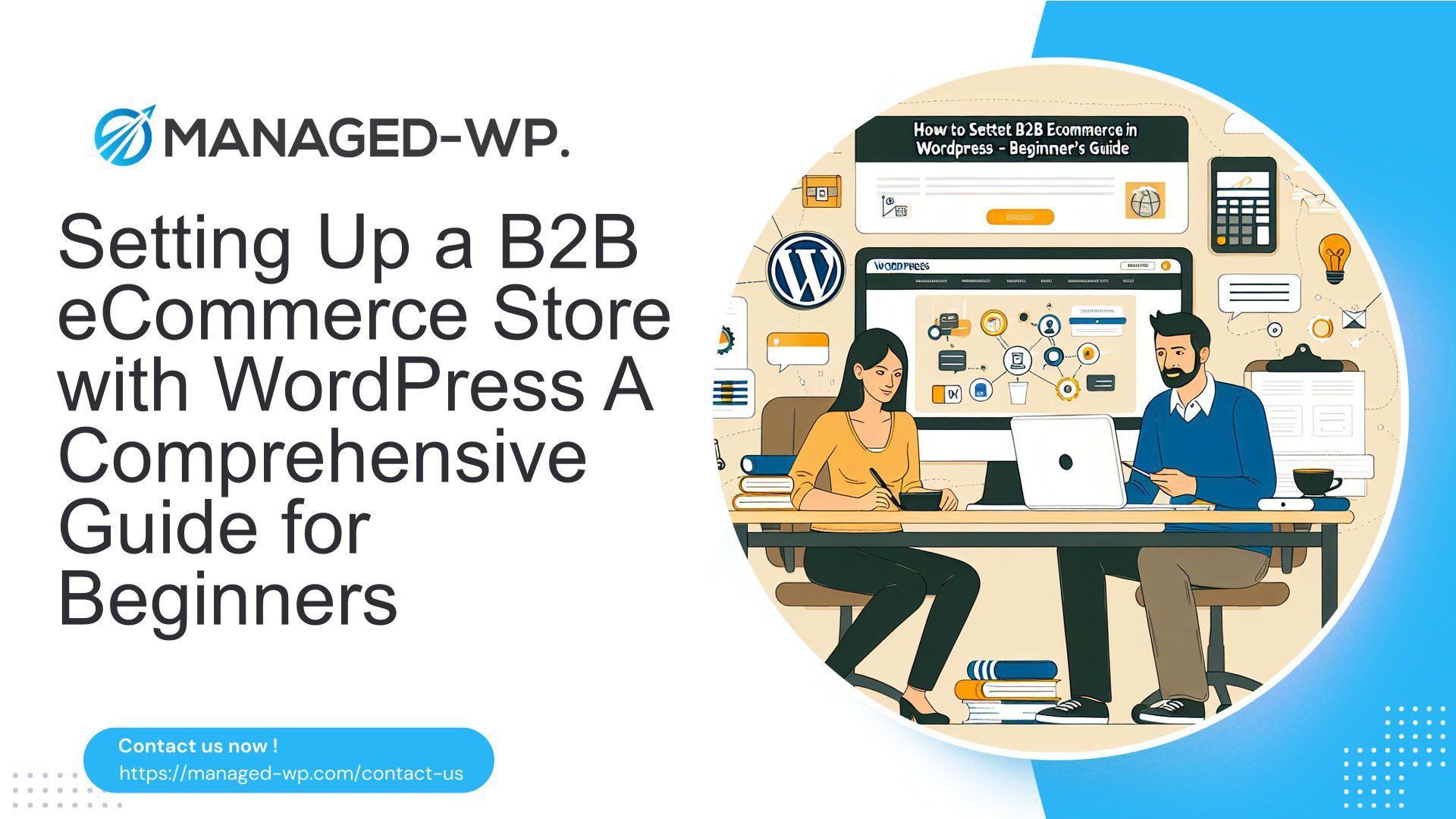在當今數位時代,擁有強大的線上影響力對於各種規模的企業都至關重要。建立和維護線上形象的關鍵要素之一是有效的網站管理。網站管理涵蓋廣泛的技術方面,以確保您的網站具有視覺吸引力、用戶友好、安全且針對搜尋引擎進行了最佳化。
無論您是經驗豐富的企業主還是剛起步,了解網站管理的基礎知識對於您在線業務的成功至關重要。本文旨在為您全面概述每個企業主都應該了解的網站管理技術方面。透過深入研究這些關鍵因素,您將掌握做出明智決策和優化網站以獲得成功的知識。
那麼讓我們深入探討網站管理的關鍵技術面!從網站設計和功能到搜尋引擎優化和安全,我們將涵蓋所有內容。讀完本文後,您將擁有紮實的知識基礎,可以將您的網站提升到新的水平。 👨💻💪
了解基礎知識
在當今數位時代,擁有強大的線上影響力對於各種規模的企業都至關重要。一個設計良好、功能正常的網站是建立線上形象的關鍵要素之一。然而,僅僅擁有一個網站是不夠的。需要對其進行有效的管理以確保其持續成功和最佳性能。這就是網站管理發揮作用的地方。 🌐
什麼是網站管理?
網站管理是指監督和維護網站以確保其順利運作、安全和整體效能的過程。它涉及廣泛的任務和職責,幫助保持網站更新、安全並與企業或組織的目標和宗旨保持一致。
網站管理涵蓋各個方面,其中包括:
- 內容更新: 定期更新網站內容,以保持其新鮮度、相關性和對訪客的吸引力。這可以包括添加新的部落格文章、更新產品描述或上傳新的圖片。
- 網站設計: 確保網站的設計保持現代、用戶友好和視覺吸引力。這可能涉及對網站的佈局、顏色、字體和整體美觀度進行更改。
- 技術維護: 執行定期維護任務,例如軟體更新、資料庫最佳化和伺服器監控,以確保網站順利且有效率地運作。這也包括修復可能出現的任何技術問題,例如斷開的連結或錯誤頁面。
- 效能優化: 透過提高網站的載入速度、回應能力和整體使用者體驗來優化網站的效能。這可能涉及壓縮圖像、縮小程式碼以及優化網站的結構和佈局。
- 安全管理: 實施安全措施保護網站及其訪客免受網路威脅,例如駭客攻擊、惡意軟體和資料外洩。這包括定期備份、SSL 憑證和強大的安全性外掛程式。
網站管理及其重要性
有效的網站管理至關重要,原因如下:
- 使用者體驗: 一個管理良好的網站可以為訪客提供無縫且愉快的瀏覽體驗。定期更新的內容、快速的載入時間和便利的導航都有助於帶來正面的使用者體驗,從而可以提高參與度、轉換率和客戶忠誠度。
- 搜尋引擎優化(SEO): 網站管理對於提高網站在搜尋引擎結果中的可見性起著至關重要的作用。定期更新內容、優化關鍵字和解決技術問題可以幫助提高搜尋引擎排名並吸引更多自然流量。
- 品牌聲譽: 如果網站管理不善,資訊過時、連結斷開或存在安全漏洞,可能會對公司的品牌聲譽產生負面影響。另一方面,維護良好的網站傳達出專業、可靠性和可信度。
- 安全: 隨著網路威脅的不斷增加,確保網站的安全至關重要。定期的網站管理包括實施安全措施、監控潛在漏洞以及跟上最新的安全性更新。
總之,網站管理是維持成功的網路形象的關鍵方面。從保持內容新鮮和最新到優化效能和安全性,有效的網站管理有助於提供積極的用戶體驗、提高搜尋引擎排名和良好的品牌聲譽。請繼續關注,以更詳細地探索網站管理的各個方面。
網站管理的關鍵技術面
🌐 在當今的數位世界中,擁有一個精心設計且高效管理的網站對於任何企業的成功至關重要。從吸引訪客到推動轉化,網站的技術方面在創造積極的用戶體驗方面發揮著至關重要的作用。在本文中,我們將探討網站所有者應考慮的一些關鍵技術方面,以確保其在線狀態得到最佳化。
網站設計和佈局
🎨 網站設計和佈局是創造引人入勝的使用者體驗的基本面向。具有視覺吸引力且用戶友好的網站可以吸引訪客並讓他們對探索您的內容保持興趣。設計網站時務必考慮目標受眾,確保佈局直覺且易於瀏覽。應仔細選擇配色方案、字體和圖形等元素,以反映您的品牌形象並增強整體美感。
➡️ 網站設計和佈局 ➡️
網站功能和可用性
🖱️確保您的網站運作順暢且使用者友好對於提供正面的瀏覽體驗至關重要。網站功能是指允許使用者參與您的內容的功能和互動元素。一些重要的考慮因素包括跨各種裝置相容性的響應式設計、直覺的導航選單、易於填寫的表格和快速載入的頁面。透過優先考慮功能和可用性,您可以讓訪客在您的網站上停留更長時間並鼓勵他們再次造訪。
搜尋引擎優化(SEO)
🔍 搜尋引擎優化 (SEO) 是優化您的網站以提高其在搜尋引擎結果頁面上的可見性和排名的做法。透過策略性地整合相關關鍵字、優化元標籤和創建高品質內容,您可以增加網站被潛在訪客發現的機會。優化良好的網站可以吸引自然流量並提高您的線上形象,最終為您的企業帶來更多的轉換和收入。
網站安全
🔒 網站安全是網站管理的關鍵面向。保護您的網站免受駭客或惡意軟體等潛在威脅,對於維護您的業務完整性和確保使用者資訊安全至關重要。實施 SSL 憑證、防火牆保護和定期安全更新等安全措施可以幫助降低風險並保護您的網站及其訪客。
內容管理
📝 有效的內容管理是讓您的網站保持最新和相關性的關鍵。定期更新您的內容不僅可以吸引訪客,還有助於提高您的搜尋引擎排名。內容管理系統 (CMS) 讓您可以輕鬆地在您的網站上建立、編輯和發佈內容,而無需技術專業知識。透過使用適當的標題、副標題和元標記來組織您的內容,您可以增強整體使用者體驗並提高搜尋引擎可見性。
網站效能和速度
⚡ 快速且反應迅速的網站對於提供積極的使用者體驗至關重要。載入時間緩慢可能會導致訪客沮喪並產生高跳出率。優化網站效能涉及多種因素,例如優化圖片大小、最小化 CSS 和 JavaScript 檔案以及利用快取技術。優先考慮網站速度可以顯著影響用戶滿意度、潛在客戶的產生以及整體轉換率。
資料備份和復原
💾 定期備份您的網站資料對於防止因技術問題或安全漏洞而導致任何潛在的資訊遺失至關重要。擁有可靠的資料備份系統可確保您在發生資料遺失時能夠快速將網站還原到先前的狀態。這項主動措施讓您安心,並允許您有效地恢復您的網站,最大限度地減少停機時間和對您的業務的潛在負面影響。
網站分析與追蹤
📊 追蹤和分析您網站的效能對於做出數據驅動的決策和優化您的線上形象至關重要。實施網站分析工具(例如 Google Analytics),您可以收集有關訪客行為、流量來源和轉換指標的寶貴見解。透過監控這些分析,您可以確定需要改進的領域,衡量您的行銷活動的成功,並做出明智的決策來提高您網站的有效性。
👉 透過考慮網站管理中的這些關鍵技術方面,您可以建立一個不僅吸引訪客而且還提供卓越使用者體驗的網站。從設計和功能到安全和分析,每個方面對於確保您的線上業務成功都發揮著至關重要的作用。因此,請花時間評估您網站的技術方面並進行必要的改進,以在當今競爭激烈的數位環境中保持領先地位。
網站管理不善的後果
🔍 介紹
在當今的數位時代,擁有一個管理良好的網站對於各種規模的企業來說都至關重要。管理不善的網站可能會對您的品牌、用戶體驗和整體線上形象產生嚴重影響。從技術挑戰到安全風險,忽視適當的網站管理可能會導致您的線上成功遭受重大挫折。在本文中,我們將探討網站管理不善可能產生的一些主要影響以及如何克服它們。
💻 技術挑戰和性能問題
忽視網站管理的主要後果之一是出現技術挑戰和效能問題。這些問題可能會對您網站的功能、速度和整體使用者體驗產生不利影響。由於網站管理不善而可能出現的一些常見技術挑戰包括:
- 頁面載入時間緩慢:如果網站沒有適當的優化,則可能需要很長時間才能加載,這會導致訪客感到沮喪並可能放棄網站。
- 斷開的連結和重定向:斷開的連結和不正確的重定向會對您網站的可用性產生負面影響,並損害您的搜尋引擎排名。
- 過時的軟體和插件:未能定期更新您的網站軟體和外掛程式可能會導致您的網站容易受到安全漏洞和相容性問題的攻擊。
為了克服這些技術挑戰,投資定期的網站維護和更新至關重要。這包括執行常規軟體更新、優化網站速度以及定期檢查斷開的連結。
🔒 安全風險和漏洞
網站管理不善也會帶來各種安全風險和漏洞。這些風險可能會損害您的網站及其所保存的資料的完整性和機密性。以下是忽略網站管理的一些潛在安全隱憂:
- 惡意軟體和駭客攻擊:過時的軟體和外掛程式可能會使您的網站輕鬆成為駭客和惡意軟體攻擊的目標,從而導致資料外洩和聲譽損害。
- 缺乏 SSL 加密:如果沒有適當的 SSL 證書,您的網站可能缺乏安全傳輸敏感資訊(例如密碼或信用卡詳細資訊)所需的加密。
- 弱密碼和用戶存取控制:不良的密碼習慣和不充分的使用者存取控制可能會使未經授權的個人更容易存取您網站的後端。
為了降低安全風險,優先考慮網站安全措施至關重要,例如實施強密碼、定期備份、SSL 憑證和進行安全審核。
🌐 視覺和品牌一致性
管理不善的網站可能會對您的品牌的視覺識別和一致性產生負面影響。整個網站的一致性對於與受眾建立信任和熟悉至關重要。以下是忽略網站管理的一些視覺意義:
- 品牌不一致:顏色、字體和圖像的不一致使用會造成混亂並削弱您的品牌形象。
- 過時的設計:過時的網站設計會給人留下您的業務落後的印象,並可能嚇跑潛在客戶。
- 移動響應能力差:隨著行動裝置的使用越來越多,不支援行動裝置的網站可能會導致糟糕的使用者體驗和潛在的客戶流失。
為了保持視覺一致性和強大的品牌影響力,請定期檢視和更新您網站的設計元素,並確保它們符合您的品牌指南。
👥 使用者體驗和參與度
您的網站的使用者體驗 (UX) 和參與度是促成其成功的關鍵因素。網站管理不善會對這些因素產生直接影響。以下是由於忽略網站管理而對使用者體驗和參與度產生的一些影響:
- 跳出率高:管理不善的網站可能會有較高的跳出率,因為如果用戶遇到載入時間緩慢、連結斷開或導航結構混亂的情況,他們很可能會離開。
- 缺乏新鮮且相關的內容:忽略定期更新您的網站新的相關內容可能會導致用戶參與度下降和搜尋引擎可見度降低。
- 功能有限:過時的外掛程式或軟體可能會限制您網站的功能,阻止使用者存取某些功能或服務。
為了增強使用者體驗並增加網站參與度,必須優先考慮網站維護,提供新鮮和有價值的內容,並定期監控使用者行為以確定需要改進的領域。
✅ 結論
從技術挑戰和安全風險到品牌一致性和使用者體驗,網站管理不善的影響是深遠的。忽視適當的網站管理可能會阻礙您的線上成功並損害您的品牌聲譽。透過投資定期維護、安全措施和以使用者為中心的方法,您可以克服這些挑戰並確保您的網站成為實現業務目標的寶貴資產。
點這裡 了解有關使用 WordPress 自動化克服技術挑戰的更多資訊。
聘請專業人士或自己動手
在當今數位時代,建立線上形象對於各種規模的企業來說都至關重要。精心設計的網站不僅可以反映您的品牌,還可以作為強大的行銷工具。然而,在管理網站時,企業主經常面臨一個困境:應該聘請專業人士還是採取 DIY 方式?
何時聘請專業人士
雖然採取 DIY 方式最初看起來很有吸引力,但在某些情況下,聘請專業人士可能會改變整個局面。請考慮以下情況:
- 缺乏專業知識:如果您沒有 Web 開發經驗或缺乏技術技能,那麼聘請專業人士可以節省您的時間並避免挫折感。專業人士擁有創建符合您的業務目標的客製化、功能性網站的專業知識。
- 複雜功能:如果您的網站需要高級功能或集成,例如電子商務功能或客戶門戶,最好交給專家。他們擁有無縫實現和維護這些複雜功能的專業知識。
- 有限時間:經營企業涉及多項職責,管理網站可能非常耗時。聘請專業人士可以讓您專注於核心業務活動,而他們則負責網站維護、安全和更新。
- 增強安全性:網路安全威脅不斷演變,受到感染的網站可能會為您的業務帶來災難。專業人員會隨時了解最新的安全實踐,確保您的網站免受潛在攻擊。
了解DIY網站管理
另一方面,在某些情況下,採用 DIY 方式進行網站管理可能是可行的選擇。請考慮以下因素:
- 預算限制:如果資金有限,選擇 DIY 方式可以更經濟實惠。借助用戶友好的網站建立器和模板,您可以創建一個基本的網站而無需花費大量金錢。
- 創意控制:管理您的網站使您可以完全控制其設計和內容。您可以嘗試不同的版面、顏色和視覺效果,以符合您的品牌形象和目標受眾。
- 更新彈性:控制您的網站意味著您可以隨時進行更新和更改。無論是新增內容、更新產品清單或變更影像,您都可以靈活地進行調整,而無需依賴第三方。
然而,值得注意的是,即使採用 DIY 方法,您可能仍然需要偶爾的專業協助。例如,如果您遇到超出您專業知識範圍的技術問題,最好尋求專業人士的協助,以避免任何潛在的停機或網站錯誤。
最終,聘請專業人員或自己管理網站的決定取決於各種因素,例如您的預算、技術能力、時間可用性以及網站要求的複雜性。無論您選擇何種方式,確保您的網站獲得持續的支援和維護至關重要。
📌 如果您決定聘請專業人士來管理您的 WordPress 網站,請考慮探索全天候託管 WordPress 支持 在这里,。他們提供全面的支持,以確保您的網站順利運行,讓您專注於發展業務!
有效網站管理的工具和資源
在當今數位時代,擁有一個管理良好的網站對於企業和個人來說都至關重要。無論您是經驗豐富的網站管理員還是剛起步,擁有正確的工具和資源都可以確保您的網站順利且有效率地運作。
熱門網站管理工具
當涉及有效地管理網站時,擁有合適的工具可以節省您的時間和精力。以下是一些可以幫助簡化您的流程的熱門網站管理工具:
- 內容管理系統 (CMS): 像 WordPress 這樣的強大的 CMS 可以提供用戶友好的介面來創建和更新內容、管理外掛和主題以及針對搜尋引擎優化您的網站,從而簡化網站管理。 WordPress 擁有豐富的外掛和主題庫,提供了無限的客製化和功能可能性。
- 網站分析工具: 了解您的網站的運作情況是提高其成功率的關鍵。 Google Analytics 等工具可以提供有關訪客行為、流量來源和轉換率的寶貴見解。有了這些數據,您可以做出明智的決策來優化您的網站並吸引更多的流量和轉換。
- SEO工具: 搜尋引擎優化 (SEO) 對於吸引自然流量到您的網站至關重要。 SEMrush 和 Moz 等工具可以幫助您識別關鍵字、分析競爭對手的策略並優化您的內容以在搜尋引擎結果頁面 (SERP) 中獲得更高的排名。
- 網站安全工具: 確保網站安全對於保護您的資料和訪客的資訊至關重要。 Sucuri 和 Wordfence 等工具提供強大的安全功能,包括惡意軟體掃描、防火牆保護和即時威脅監控。
- 網站速度優化工具: 網站載入緩慢會導致使用者體驗不佳和跳出率高。 GTmetrix 和 Pingdom 等工具可以分析您網站的速度並提供優化其效能的建議,例如壓縮圖片、縮小 CSS 和 JavaScript 檔案以及快取內容。
有用的資源以了解更多信息
除了使用正確的工具外,了解網站管理的最新實踐和趨勢也至關重要。以下是一些有價值的資源,可幫助您擴展知識:
- 官方文件和社群: 大多數網站管理平台(包括 WordPress)都提供大量文件和社群論壇,您可以在其中找到常見問題的答案、解決問題並與其他使用者聯繫。
- 部落格和線上出版物: 關注網頁開發和數位行銷領域的知名部落格和出版物可以為您提供寶貴的見解和教程。一些受歡迎的包括 Smashing Magazine、Moz Blog 和 WPBeginner。
- 線上課程和教學: Udemy 和 Coursera 等平台提供有關網站管理、SEO、網站設計等方面的廣泛課程。這些課程提供結構化的學習和實踐練習來提高您的技能。
- YouTube 頻道和播客: 影片教學和播客是學習和了解網站管理的好方法。 WP101 等頻道和「WP Elevation Podcast」等播客提供專家見解、技巧和行業專業人士的訪談。
- 專業協會和論壇: 加入與網站管理相關的專業協會和論壇可以讓您接觸到志同道合的專業人士網絡,他們可以為您提供指導、分享經驗並推薦寶貴的資源。
透過利用正確的工具和資源,您可以有效地管理您的網站,優化其效能並確保無縫的使用者體驗。那麼,為什麼不探索這些選項並將您的網站管理技能提升到一個新的水平呢?
有關 WordPress 中可用於網站管理的工具的更多詳細信息,您可以查看我們的文章 WordPress 中的工具.
結論
總之,有效的網站管理對於當今數位環境中任何企業的成功至關重要。透過了解網站管理所涉及的技術方面並實施最佳實踐,企業主可以確保他們的網站在效能、安全性和使用者體驗方面得到最佳化。無論決定聘請專業人員或採取 DIY 方式,都有大量工具和資源可用於支援網站管理工作。
Managed-WP.™ 就是這樣一個提供全面網站管理解決方案的平台,憑藉其優質的託管 WordPress 雲端託管平台,Managed-WP 簡化了基礎設施管理、提供了專家支持,並提供備份管理、修補程式管理和主動監控。透過選擇像 Managed-WP 這樣可靠的託管服務供應商,企業主可以專注於發展業務,同時將網站管理交給有能力的人。
請記住,一個管理良好的網站不僅可以反映您的品牌,而且還可以成為吸引和吸引客戶的有力工具。投入時間和資源進行有效的網站管理,並收穫成功的線上形象帶來的回報。詳細了解 Managed-WP 及其產品,請訪問 管理-wp.com.
💡立即開始使用 Managed-WP 值得信賴的解決方案來優化您的網站管理策略! 💪🌐
常見問題解答
- 網站管理的關鍵技術環節有哪些?
網站管理的關鍵技術面向包括網站託管、網域管理、網站安全、網站備份、內容管理系統(CMS)、網站效能優化和搜尋引擎優化(SEO)。
- 什麼是網站託管?
網站託管是將您的網站檔案儲存在伺服器上的過程,以便您的網站可透過網路存取。選擇一家能夠提供良好正常運作時間、快速載入時間和可靠安全措施的可靠主機服務供應商非常重要。
- 為什麼網站安全很重要?
網站安全性對於保護您的網站和使用者資料免受網路攻擊、駭客攻擊和惡意軟體感染至關重要。實施強大的安全措施(例如 SSL 憑證、定期更新和安全登入憑證)至關重要。
- 什麼是內容管理系統 (CMS)?
內容管理系統 (CMS) 是一種軟體,可讓企業主無需任何技術知識即可建立、管理和更新其網站內容。流行的 CMS 平台包括 WordPress、Drupal 和 Joomla。
- 什麼是網站效能優化?
網站效能優化包括提高網站的速度、反應能力和整體效能。它包括快取、圖像優化、檔案縮小和減少伺服器回應時間等任務。



















